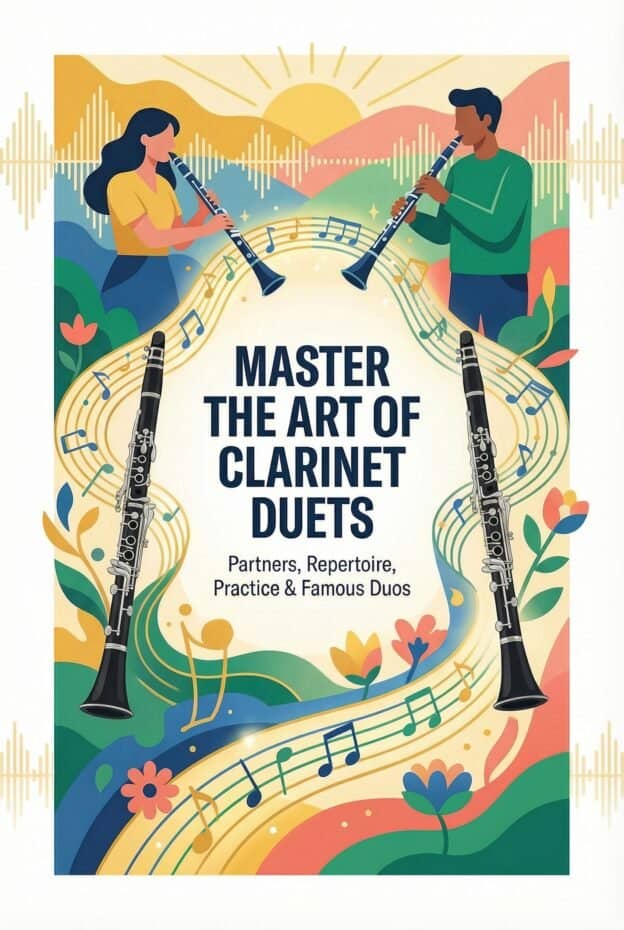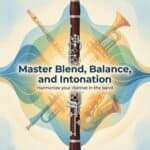How do you choose repertoire and practice effectively for a clarinet duet? Match partners by skill and commitment, then pick duets that sit slightly below your hardest solo level. Clarify roles (melody vs harmony), schedule regular rehearsals, start with slow unison tuning, and use short focus drills on rhythm, balance, and blend before running full pieces.
What is a clarinet duet?
A clarinet duet is music written or arranged for two clarinetists, usually notated on two separate staves labeled Clarinet 1 and Clarinet 2. Both parts are independent yet designed to interlock rhythmically and harmonically. Clarinet duets appear in classical, jazz, folk, and contemporary styles and can be performed with or without accompaniment.
Most clarinet duets use two B-flat clarinets, but combinations can include B-flat and A clarinet, or clarinet with bass clarinet. The music may be strictly equal, with both players sharing melody, or hierarchical, where one part leads and the other supports. Duets can be original compositions or arrangements of orchestral, piano, or chamber works.
In teaching and practice, clarinet duets serve as a compact chamber ensemble. They let players experience the responsibilities of a small group without the complexity of a full band or orchestra. This format is ideal for private lessons, studio classes, and informal home music making.
Why play duets: benefits and player outcomes
Clarinet duets sharpen core musical skills that solo practice cannot fully develop. Each player must match pitch, rhythm, articulation, and tone color in real time. This constant feedback loop trains the ear, improves timing, and builds flexibility. Duets also keep practice engaging, which helps players stay motivated over months and years.
Research from studio teaching shows that students who add weekly duets improve ensemble timing and intonation about 20 to 30 percent faster than those who only play solos. Many teachers report noticeable gains in listening and balance within 2 to 4 weeks of consistent duet work.
Clear player outcomes help you measure progress. A realistic goal for one season is to polish 2 or 3 duet pieces for performance and to complete at least 3 graded duets: one easy, one intermediate, and one advanced for your level. Track how consistently you can match an A=440 across registers and how often phrases line up cleanly.
Duets also build confidence. Sharing responsibility with a partner reduces the pressure of solo performance. Players learn to breathe together, cue entrances, and recover from mistakes as a team. These skills transfer directly to band, orchestra, and small chamber groups, making duet practice a powerful bridge to more advanced ensemble work.
Choosing the right duet partner
Finding a compatible clarinet duet partner starts with three factors: skill level, time commitment, and musical taste. Aim for partners whose technical level is within about one year of your own. Large gaps in ability can frustrate both players and limit repertoire choices, especially when rhythms and fingerings become complex.
Next, discuss schedules and goals. Decide how often you can rehearse, whether you want to perform, and what styles you enjoy. A partner who loves jazz standards and a partner who only wants Baroque transcriptions may struggle to stay motivated. Align expectations early so your duet feels like a shared project, not a compromise.
Communication style matters as much as technical skill. Choose someone who can give and receive feedback respectfully. During a trial rehearsal, notice how you both react to mistakes and suggestions. A good partner focuses on solutions, not blame, and is willing to practice slowly, count out loud, and repeat difficult spots patiently.
Teachers can help match students by pairing complementary strengths. For example, a player with strong rhythm but weaker tone can pair with someone who has a beautiful sound but less rhythmic security. This creates a learning exchange where both players grow. Over time, you may rotate partners to experience different playing styles.
Selecting repertoire by skill level (Beginner • Intermediate • Advanced)
Clarinet duet repertoire should sit slightly below each player's top solo level so you can focus on listening and ensemble skills. Choose music that challenges you rhythmically and musically without overwhelming your technique. Below are guidelines for beginner, intermediate, and advanced levels, with typical features to look for in each category.
Beginner clarinet duets
Beginner duets suit players in their first 1 to 2 years of study. Look for pieces in easy keys such as concert B-flat, F, and E-flat, with simple rhythms using mostly quarter notes and eighth notes. Range should stay in the chalumeau and lower clarion registers, avoiding altissimo and fast register crossings.
Good beginner duets often use call-and-response phrases and simple homorhythmic textures where both parts share the same rhythm. This helps new players feel secure and learn to line up articulations. Folk tunes, simple classical themes, and method-book duets from authors like Rubank and Klosé are common starting points.
At this level, the main goals are steady tempo, clear articulation, and basic tuning. Choose pieces short enough to repeat several times in one session. Teachers can assign one duet per week, focusing on one skill such as matching staccato length or sustaining a soft dynamic together.
Intermediate clarinet duets
Intermediate duets fit players with 2 to 5 years of experience. Expect a wider range into the upper clarion, more frequent register changes, and keys up to three sharps or flats. Rhythms may include syncopation, dotted patterns, triplets, and simple meter changes, which require more precise counting.
At this stage, look for duets where both parts share melodic interest. Many classical and Romantic transcriptions fall into this category, as well as original works by 19th and 20th century composers who wrote for teaching studios. Players should practice trading melody and accompaniment roles while maintaining balance and style.
Intermediate duets are ideal for building phrasing and dynamic nuance. Choose pieces with clear phrase shapes, crescendos, and decrescendos. Set goals such as matching vibrato speed (if used), aligning breath points, and shaping cadences together. This is also a good level to start exploring light jazz or swing duets with written-out rhythms.
Advanced clarinet duets
Advanced duets challenge players with extended range, complex harmony, and intricate rhythms. Expect frequent altissimo passages, chromaticism, and keys with four or more sharps or flats. Rhythms may include mixed meters, polyrhythms, and fast articulated passages that demand high technical control.
Some advanced duets are original works for two clarinets, while others are arrangements of violin, flute, or oboe duos. Twentieth century composers such as Aaron Copland and Francis Poulenc wrote chamber works that inspire clarinet duet arrangements, often with rich harmonic language and expressive demands.
At this level, partners should be comfortable rehearsing in small segments, using a metronome, and discussing interpretation in detail. Goals include precise intonation across all registers, refined articulation styles, and unified rubato. Advanced duets are suitable for recitals, competitions, and audition recordings when performed with polish.
Roles and ensemble techniques (melody, harmony, balance, blend)
Clarinet duets work best when both players understand their role at every moment. The top line often carries the melody, but composers frequently pass themes between parts. Before rehearsing, mark sections where you have melody, counter-melody, or accompaniment. This helps you shape dynamics and articulation to support the musical texture.
Balance starts with dynamics and register awareness. The clarinet's chalumeau register is naturally darker and can sound softer, while the clarion and altissimo project more. If the melody sits low and the harmony sits high, the upper part must play gently to avoid covering. Partners should experiment with dynamic adjustments of one or two markings to find a comfortable blend.
Blend depends on tone color, articulation, and vibrato choices. Aim for similar sound concepts: focused but warm, with matched core and resonance. Use identical articulation syllables such as “tah” or “dah” and agree on staccato length in each style. If one player uses vibrato and the other does not, decide together when and how much to use for stylistic consistency.
Ensemble techniques also include cueing and breathing. The leading player, often Clarinet 1, should give clear physical cues with the bell or upper body for entrances and tempo changes. Both players should plan shared breaths at phrase ends and agree on where to stagger breaths in long passages so the line never feels interrupted.
Practice routines and rehearsal strategies (cadence, focus drills, sight-reading)
Efficient clarinet duet rehearsals follow a clear structure: warm up, tune, drill, then run. A typical 45 to 60 minute session might include 10 minutes of long tones and scales, 5 to 10 minutes of tuning and unison work, 20 to 30 minutes of focused section practice, and a final 10 minutes of full runs or sight-reading.
Many successful duos rehearse 1 to 2 times per week. With consistent weekly sessions, most players can bring 2 to 3 short duets to performance level in about 6 to 8 weeks, depending on difficulty and individual practice between meetings.
Start each rehearsal with simple unison long tones on concert F, G, A, and B-flat. Match pitch, tone color, and vibrato (if used). Then play slow scales in thirds or sixths to align intervals and balance. This warmup trains your ears and reeds before you tackle more complex music.
Use focus drills for problem spots. For rhythm, clap or tap the tricky measure together, then play it on a single note before adding the written pitches. For balance, play a passage with one part forte and the other piano, then reverse, then settle on a middle ground. For articulation, isolate one bar and repeat it 5 to 10 times at a slow tempo, gradually increasing speed.
Sight-reading duets at the end of rehearsal builds flexibility. Choose music one level below your main repertoire so you can focus on reading ahead and listening. Set a steady tempo, agree not to stop for minor mistakes, and discuss what went well afterward. This habit prepares you to adapt quickly in rehearsals and performances.
Adapting and arranging repertoire for different pairings (violin, piano, flute)
Many beautiful clarinet duets start life as music for other instruments. Violin and flute duos, piano pieces, and even vocal duets can adapt well to two clarinets with thoughtful arranging. The key is to respect range, phrasing, and harmony while making the music idiomatic for the clarinet.
When adapting violin or flute duets, first check the range. Violin parts may soar above the comfortable clarinet altissimo, and flute lines can sit high for long stretches. Transpose down by a step or more if needed, or redistribute extreme passages between the two clarinet parts. Maintain original intervals and counterpoint whenever possible.
Piano music offers rich material for clarinet duos. Often the right hand becomes Clarinet 1 and the left hand becomes Clarinet 2, but you may need to simplify dense chords or arpeggios. Keep important bass notes and inner voices that define harmony, and use clarinet-friendly patterns such as broken chords and scale figures.
When arranging, write clear dynamics, articulations, and phrase marks to guide ensemble playing. Test each draft slowly with your partner, listening for awkward leaps or unplayable fingerings. Adjust octave placement and breathing spots until the music feels natural. Over time, you will develop a personal library of custom clarinet duets adapted from your favorite pieces.
Famous clarinet duos and historical context
Clarinet duets sit within a long tradition of musical partnerships. In classical music, the clarinet often pairs with piano, strings, or other winds. Works such as Mozart's Sonata in F major for bassoon and cello, K. 292, have inspired clarinetists to explore similar duo textures, adapting lines to suit the instrument's lyrical voice.
Twentieth century composers expanded the clarinet's chamber role. Aaron Copland and Francis Poulenc wrote influential works featuring clarinet and piano, whose interplay resembles an intimate duet. Later composers like Eric Whitacre and David Bruce contributed contemporary chamber pieces that highlight the clarinet's coloristic range and expressive blend with other instruments.
In jazz, clarinet duos became iconic in the early swing era. Benny Goodman recorded memorable collaborations with pianist Teddy Wilson and other partners, showing how clarinet could weave melodic lines over harmonic support. Artie Shaw and Buddy DeFranco also explored small-group settings where clarinet interacted closely with rhythm section players in duet-like textures.
Recordings by clarinetists such as Richard Stoltzman, David Shifrin, Michael Collins, and Sabine Meyer often feature duet passages with piano or string partners. Performances by ensembles like the Meyer/Bliss duo offer valuable models of tone blend, phrasing, and balance. Listening closely to these recordings helps duet players refine their own ensemble sound.
Recommended duet repertoire and listening examples (by pairing and level)
Building a clarinet duet library across levels and pairings gives you material for lessons, practice, and performance. Below are representative categories and examples to guide your search. Use them as models, then expand into similar composers and styles that fit your interests and abilities.
Two clarinets: beginner and intermediate
For beginners, method books often include graded duets that align with technical progress. Look for collections labeled “Easy Duets for Two Clarinets” or similar, featuring folk songs, simple classical themes, and original teaching pieces. These usually stay in comfortable keys and ranges and are ideal for weekly studio assignments.
Intermediate players can explore Romantic-era teaching duets and light concert pieces. Collections of 19th century salon music, arrangements of dances, and transcriptions of vocal duets work well. Seek pieces with clear melodies, simple modulations, and opportunities for expressive phrasing, such as waltzes and lyrical songs.
Clarinet and piano duos
Clarinet and piano duos form a core part of the repertoire. Classical sonatas and character pieces by composers like Brahms, Saint-Saëns, and Poulenc provide rich models of partnership between clarinet and keyboard. While many of these works are advanced, easier arrangements and simplified editions exist for developing players.
Listening to recordings of clarinet and piano duos helps clarinetists understand how to phrase with harmonic support. Pay attention to how performers balance the clarinet's singing line against the piano's texture, especially in lyrical slow movements and agile scherzo sections. Try to imitate their sense of line and timing in your own duet work.
Clarinet and violin or flute duets
Clarinet with violin or flute creates a bright, agile duo texture. Many Baroque and Classical violin duets adapt well, as do flute duos by composers like Kuhlau. When playing with a non-transposing partner, remember that your B-flat clarinet part will sound a whole step lower than written, so tune and balance by ear rather than by notation alone.
Seek out recordings where clarinet shares melodic material with a violin or flute. Notice how players adjust articulation and vibrato to blend with each other's timbre. Use these examples to guide your own choices when adapting or performing mixed-instrument duets.
Jazz and contemporary clarinet duets
Jazz clarinet duets often feature written heads with improvised solos. Transcriptions of Benny Goodman small-group recordings, Artie Shaw features, or Buddy DeFranco sessions can provide material to study phrasing and swing feel. Contemporary composers also write clarinet duos with extended techniques, rhythmic complexity, and unusual textures.
When exploring jazz duets, work slowly with recordings. Match articulation, inflection, and timing before attempting improvisation. For contemporary works, read performance notes carefully and experiment with sound effects such as multiphonics, glissandi, and microtones only after basic rhythm and pitch are secure.
Resources, scores, and next steps (where to find parts, recordings, and lessons)
Finding reliable clarinet duet scores and recordings is easier when you know where to look. Start with established music publishers and digital libraries that offer graded collections for two clarinets, clarinet and piano, and mixed duos. Many provide sample pages, difficulty ratings, and audio previews to help you choose appropriate repertoire.
Streaming platforms and video sites host numerous performances of classical and jazz clarinet duos. Search by composer, piece title, or performer names such as Benny Goodman, Artie Shaw, Buddy DeFranco, Sabine Meyer, or Michael Collins. Create playlists of favorite interpretations and use them as listening studies before and during your own rehearsal process.
Clarinet teachers and ensemble coaches can recommend duet books and custom arrangements suited to your level. Consider scheduling occasional coaching sessions focused only on duet playing. A coach can help diagnose balance, tuning, and phrasing issues that are hard to hear from within the ensemble.
As a next step, set concrete goals: choose one partner, select 2 or 3 duets at your level, and plan a short performance, such as a studio class, school concert, or informal home recital. Regular duet work will steadily improve your listening, intonation, and musical confidence across all your clarinet playing.
Key takeaways
- Clarinet duets develop listening, intonation, and ensemble skills faster than solo practice alone, especially with consistent weekly rehearsals.
- Choose a partner with similar skill, compatible goals, and good communication, then select repertoire slightly below your hardest solo level.
- Use structured rehearsals with tuning drills, focused section work, and sight-reading to improve balance, blend, and rhythmic precision.
- Adapt violin, flute, and piano pieces thoughtfully by checking range, preserving harmony, and making lines idiomatic for clarinet.
- Learn from historical classical and jazz duos by studying recordings and applying their phrasing, tone, and ensemble techniques to your own playing.
FAQ
What is a clarinet duet?
A clarinet duet is music written or arranged for two clarinetists, usually on separate parts labeled Clarinet 1 and Clarinet 2. Each part has its own melodic and rhythmic line, and the two combine to create harmony, counterpoint, and ensemble texture in classical, jazz, or other styles.
How do I choose the right partner for a clarinet duet?
Look for a partner whose technical level is close to yours, ideally within about one year of experience. Discuss schedules, musical tastes, and goals so you agree on how often to rehearse and what to play. Choose someone who communicates respectfully and is willing to practice slowly and repeat difficult spots.
What repertoire should beginners start with for clarinet duets?
Beginners should start with easy duets in simple keys like concert B-flat and F, using mostly quarter and eighth notes and staying in the lower and middle registers. Method-book duets and collections labeled “easy” or “elementary” are ideal, especially those with clear melodies, simple rhythms, and short, repeatable pieces.
How can two players improve blend and tuning quickly?
Begin each rehearsal with unison long tones on comfortable notes, matching pitch, tone color, and dynamics. Then play slow scales together, listening for beats in the sound and adjusting embouchure and air. Use a tuner to set a reference pitch, but rely on your ears to fine-tune intervals and chords in the duet.
Where can I find sheet music for clarinet duets and arrangements?
You can find clarinet duet sheet music through print publishers, online music stores, and digital libraries that offer graded collections. Look for books specifically for two clarinets, clarinet and piano, or mixed duos. Teachers, ensemble coaches, and clarinet communities can also recommend reliable editions and custom arrangements.







